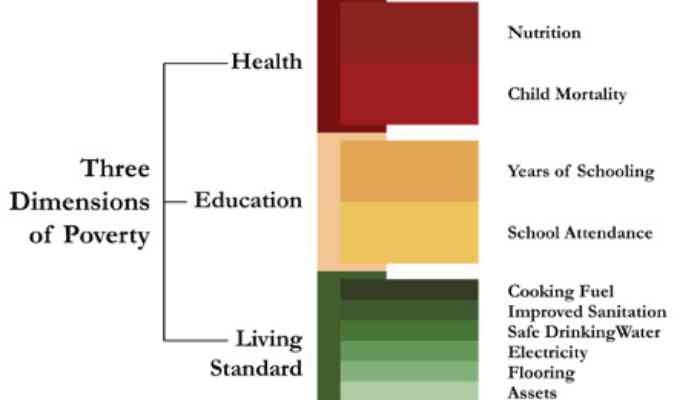About 1.3 billion people are multi-dimensionally poor across 109 countries, while differences in multidimensional poverty among ethnic groups are consistently high, according to the global Multidimensional Poverty Index (MPI) released on Thursday.
Multidimensional poverty encompasses the various deprivations experienced by poor people in their daily lives – such as poor health, lack of education, inadequate living standards, disempowerment, poor quality of work, the threat of violence, and living in areas that are environmentally hazardous, among others.
MPI, produced by the UN Development Programme (UNDP) and the Oxford Poverty and Human Development Initiative, also found that in nine specific ethnic groups surveyed, more than 90 percent of the population was trapped in poverty.
According to the report, across the 109 countries studied, a total of 1.3 billion people are multi-dimensionally poor.
“About half of them or 644 million, are children under age 18; and nearly 85 percent live in Sub-Saharan Africa or South Asia. More than 67 percent live in middle-income countries.
“Living in multi-dimensionally poverty can mean very different things.’’
The report stated that around one billion people, for example, were exposed to health risks due to solid cooking fuels, another billion live with inadequate sanitation, and another billion have substandard housing.
It stated that around 788 million lived in a household with at least one undernourished person, and about 568 million lacked improved drinking water, within a 30-minute roundtrip walk.
Achim Steiner, the UNDP administrator, said, “this is a reminder of the need for a complete picture of how people are being affected by poverty, who they are and where they live.”
Steiner also highlighted the COVID-19 pandemic factor, saying that the international community was “still grappling to understand its full impacts.”
The report noted that even though multidimensional poverty remained high, there were signs of progress in some countries, at least until the beginning of the pandemic.
“Of the 80 nations and five billion people for which there is data over time, 70 reduced their Multidimensional Poverty Index in at least one period. The fastest changes happened in Sierra Leone and Togo.”
The director of OPHI at the University of Oxford, Sabina Alkire, stressed the need to fix the structural inequalities that oppress and hinder progress.
The UN Correspondent of the News Agency of Nigeria (NAN) quoted Alkire as saying that disaggregating multidimensional poverty data by ethnicity, race, caste and gender, “unmask disparities and forms a vital guide to policymakers to leave no one behind in the last decade for action.”
Proposing solutions for this problem, the authors pointed out the example of the two poorest ethnic groups in the Gambia, that have roughly the same value on the Index but have different deprivations, indicating that different policy actions were needed to find effective solutions for different cases.
Focusing on gender, the report showed that worldwide, about two-thirds of multidimensionally poor people, or 836 million, lived in households where no woman or girl has completed at least six years of schooling.
Besides that, one-sixth of all people in this situation, or about 215 million, lived in households in which at least one boy or man has completed six or more years of schooling, but no girl or woman has.
The report also finds that these women and girls are at higher risk of suffering intimate partner violence.
source: businessday ng




